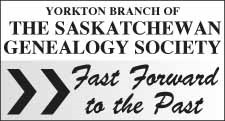As you do your genealogy research, you know that photographs are an invaluable treasure. Seeing the images of long-gone relatives brings them to life in a dimension that is deeper and richer than just reading words on a page of where they homesteaded or died. Photos allow genealogists to attach a "face to the name" in their research.
These old photos are truly one of a kind and irreplaceable. If you have old family photos, it has been suggested that you make reprints and put the originals safely away in a dry location away from direct light. Use the reprints as your "working copies" when you talk to relatives to identify who is in the photos. Then, label the back of your "working copy", and later be sure to label the original. (As a side note, remember to label for any current photos you have printed. The new photos of today will be the "old" photos of tomorrow, and in fifty years' time you may have relatives looking at these pictures and wondering who the people are. Save them the frustration of trying to collect this information.) Be sure to list the people in the photo, and also the date and the location, if possible. This information is especially valuable if the photo was taken at a location that no longer exists, like an old homestead or an old country school.
Perhaps you have old films that have long been tucked in a drawer: who could be revealed on those hidden rolls? Are they still viable films? You might want to consider a service such as Film Rescue International (www.filmrescue.com) to have these old films developed.
On another topic, have you noticed on old documents that a female surname may end in "a" while the male surname ends in "i"? If your roots are Polish, check out Polish Roots (www.polishroots.org) to learn more about deciphering surnames. The above question is addressed on this site with this quote: "As basic as this is, I still get asked a lot: why does my great-grandmother's name end in -ska? The answer is simple: Polish adjectives have different forms for the genders. Surnames ending in -ski are regarded as adjectives, so they, too, reflect gender with different endings. Thus Janowski is the nominative form for a male; Janowska is the same form for a female. The endings differ in the other cases, too: "of Janowski" is Janowskiego if referring to a male, Janowskiej if referring to a female."
In Russia, patronymic names are derived from the father. For boys, the name will end in "ovich" or "evich", while for girls, the name will end in "ovna" or "evna". If you are researching Ukrainian names, the endings do not change depending on the gender of your family member.
The Yorkton branch of the Saskatchewan Genealogy Society welcomes researchers at all stages of genealogy research. Whether you are wondering how to get started on your family tree or have been researching for a while, the group welcomes new members at any time. Perhaps you would like to make family research one of your winter projects! Get started by coming to one of the genealogy meetings. Meetings are on the second Tuesday of each month, September to May, and are held at the Yorkton Public Library. The first meeting of the new season will be on September 9 at 7:00 p.m.
Every family has a story: discover yours with the Yorkton branch of the Saskatchewan Genealogy Society! For more information call Dave at (306) 783-1093 or Glenn at (306) 782-7969.




